 Raise a Glass to Freedom
Raise a Glass to Freedom
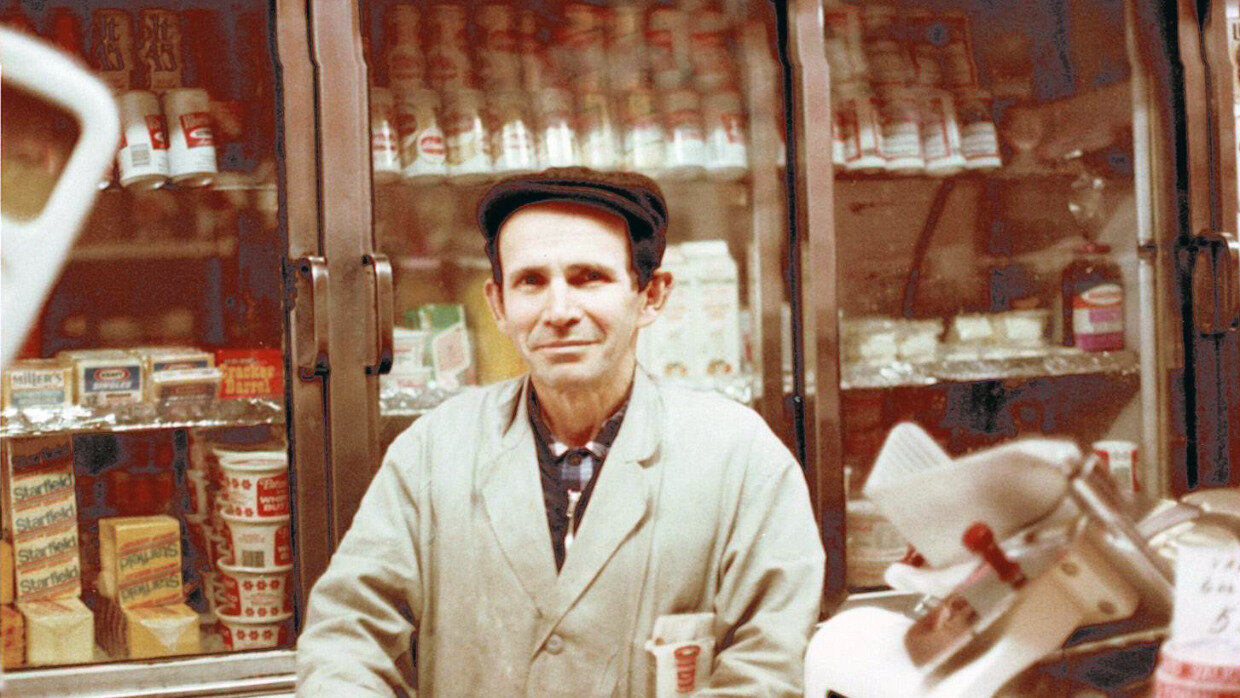

5 min read
My father’s terrifying encounter with Reinhold Feix, the sadistic German commandant.
In 1942, my father, Tzvi Hersh Kühl, was a prisoner in the Budzyń labor camp in Poland. Conditions were harsh and only those who were skilled laborers and strong had any chance to survive. The camp commandant at the time was SS Oberscharführer Reinhold Feix, the sadistic and brutal German commander in charge of the camp. He was to be avoided at all costs, as the chances of surviving an encounter with him were slim.
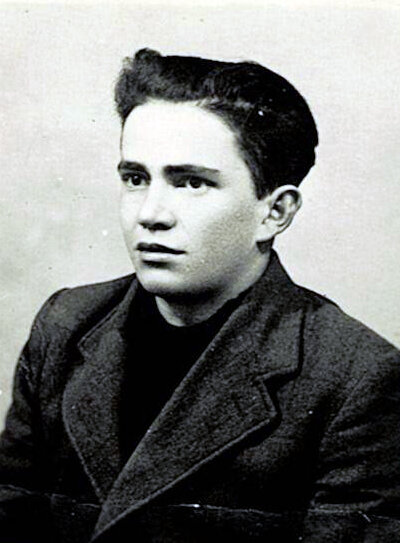 Tzvi Hersh Kühl, circa 1945
Tzvi Hersh Kühl, circa 1945
One winter evening my father and his fellow prisoners had returned to their camp barracks after working outdoors all day in subfreezing weather. Noah Stockman, a former Polish army officer and Jewish camp elder, came to my father’s group and asked for a volunteer to replace Feix’s broken office window. Understandably, nobody wanted to volunteer for this job, as Feix was sure to find fault with anything anyone had done for him. But my father knew that if no one went, Feix would likely execute the entire group. He bravely stepped forward and told Stockman that he would go. My father was the youngest in the group and was well-liked by Stockman, so sending my father was no easy task, but Stockman saw no alternative and reluctantly sent him on this hopeless mission.
My father entered the camp commander’s office and saw Feix standing there. “Are you a glazier?” Feix asked my father.
My father confirmed that he was.
Feix said, “I see you brought two panes of glass with you. If you break one of them, I’ll shoot you like a dog.”
“Okay,” my father replied. “But my hands are frozen and I’m scared. With you standing there it will be impossible for me not to break a glass. If you leave the room and don’t look over my shoulder, I’ll do the job.”
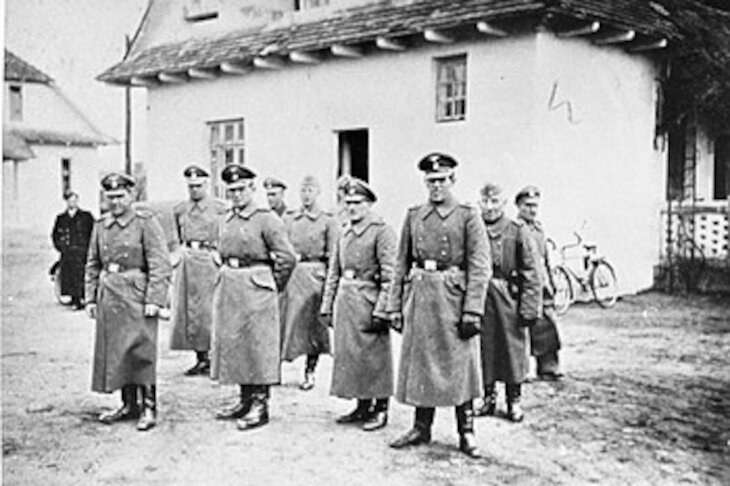 Reinhold Feix, third from left at Belzec
Reinhold Feix, third from left at Belzec
Feix stared at my father in disbelief, taken aback that this half-starved Jewish prisoner was telling him what to do. He must have been thinking, Should I kill this Jew now, or should I wait and kill him after he breaks the glass? After a few tense moments, Feix asked my father how long it would take to do the job and my father replied, “Half an hour.”
Feix walked out of the room. My father completed the job in 20 minutes and carefully cleaned the work area. Exactly 30 minutes later, Feix returned to the room and inspected the job.
After scrutinizing the window, he acknowledged that the job was well done. My father was fluent in German so the two of them conversed for a while. Feix asked my father where he learned German, and my father explained that his parents spoke German because the Polish village where they lived had originally been under Austrian rule. Feix surprised my father and asked, “Have you eaten?”
Of course, my father hadn’t. Feix called in an orderly and asked for two meals. The orderly was puzzled, since as far as he could see, only Feix was in the room (a meal would never be requested for a Jewish prisoner). When the meals arrived, my father and Feix sat at the same table and ate together.
Feix asked my father some more questions, and after they finished eating, Feix dismissed him, saying, “Now you can go back to your barracks.”
When my father returned, Stockman was relieved to see him. He apologized that my father’s bread ration was gone, but he had not expected him to return. My father said he was not hungry since he already had supper with Feix. Stockman was dumbfounded.
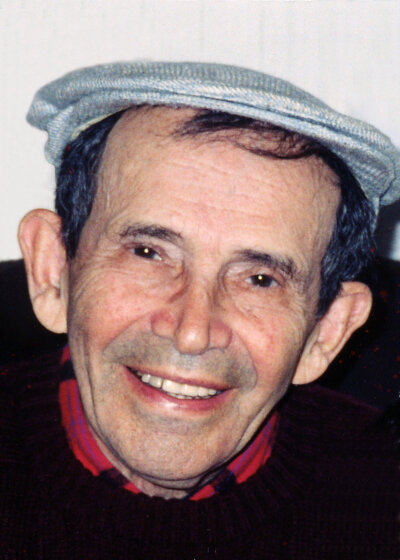 Harry Kiel, Purim 2002
Harry Kiel, Purim 2002
In the Purim story, pivotal moments occurred during meals. The Book of Esther relates that Ahasuerus, King of the Persian empire, had a mercurial temper and had killed his first queen after a royal banquet. Later, Esther, whose Jewish identity was secret, was urged by Mordechai to intercede on behalf of the Jewish people to thwart the genocidal plot being formulated by a powerful minister, the evil Haman. Esther was afraid to approach King Ahasuerus since there was a rule that none may approach the King unless they are summoned, under penalty of death. After considering Mordechai’s request, Esther decided to go, risking her life and putting the good of the people above her own safety. At a banquet attended by Ahasuerus and Haman, Esther revealed herself to be Jewish and turned the King against Haman. Thanks to her courage, Haman’s plans failed and the King ordered Haman’s execution.
After the Jewish people were miraculously saved on Purim, Mordechai and Esther proclaimed that a special Purim feast should be made to celebrate the hidden miracle that had occurred. Jews have continued to commemorate this meal annually for thousands of years. It is also traditional to acknowledge the hidden miracles by donning masks on Purim, with children often wearing costumes of popular superheroes. As Purim approaches, my thoughts turn to my personal hero – my father – and the fateful meal he shared with a villain so many years ago.
Like Queen Esther, fueled by his faith in God, my father bravely chose to help his people. Sometimes when you dine with the devil, you live to tell the tale.
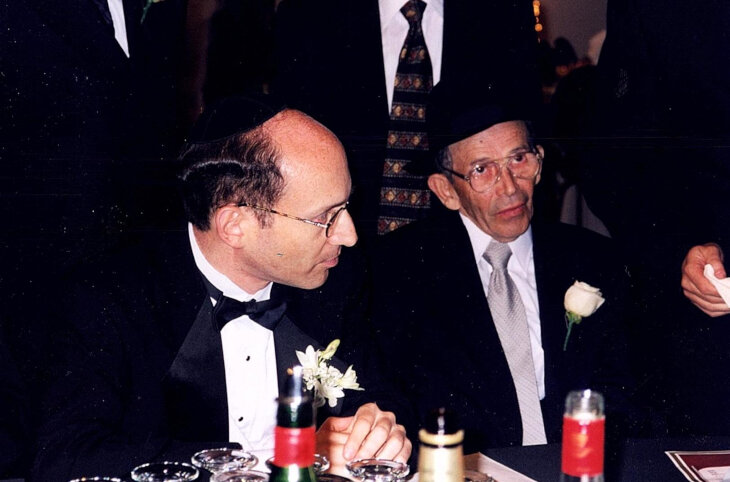 My father at my wedding in 2000
My father at my wedding in 2000
BIO: Bruce Kiel is an attorney living in Brooklyn, NY, with his wife and daughter. His father’s yahrzeit is Adar 18, just a few days after Purim. Harry Kiel (Tzvi Hersh Kühl’s name after arriving in America) passed away in 2006; may his memory be a blessing.

Lovely story.. B'H !!
A story of trepidation and bravery. May his memory be for a blessing.
Thank you for sharing this moving story about your brave father. Purim is in many of us. What a remarkable man